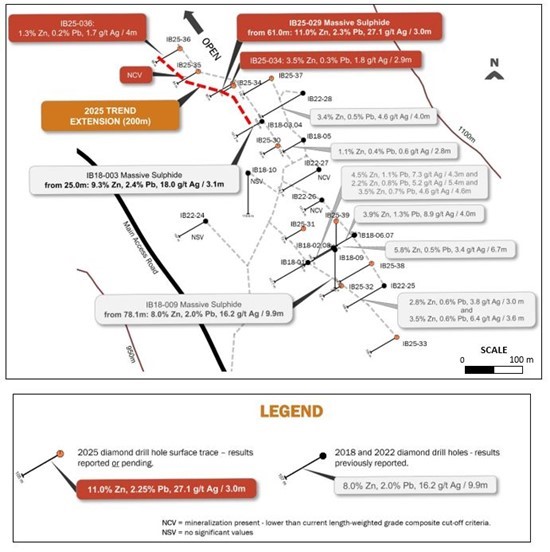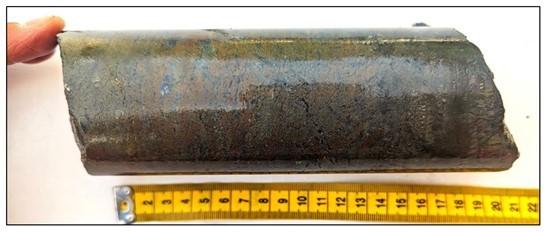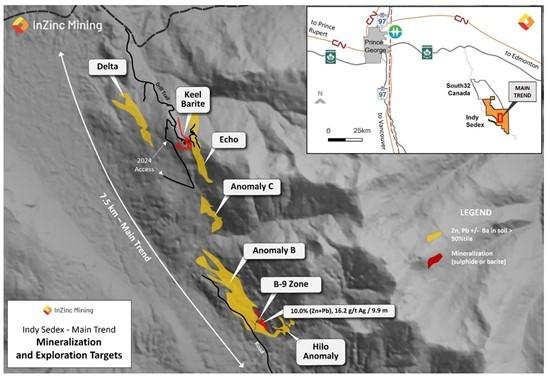
InZinc Intersects 11.0% Zn, 2.3% Pb and 27.1 g/t Ag over 3.0 m within a 40% Extension of Sedex Mineralized Trend at Indy Project, Central BC

InZinc Mining Ltd. (TSX-V: IZN) is pleased to report the first results from 2025 exploration diamond drilling at its 100% owned Indy Sedex (zinc-lead-silver-barite) project, located 90 km southeast of Prince George in central British Columbia, Canada. Results from four (of 11 completed) shallow drill holes, exploring the northern extension of near surface mineralization at the B-9 Zone, are summarized below.
2025 Results – Highlights of B-9 North Drilling (Table 1 and Figure 1)
Hole IB25-029
- Near surface massive sulphides averaging 11.0% Zn, 2.3% Pb and 27.1 g/t Ag over 3.0 m from 61.0 m downhole
- Located 80 m north of previously released Hole IB18-003 which included 9.3% Zn, 2.4% Pb and 18.0 g/t Ag over 3.1 m from 25.0 m downhole
- Depth extension was tested in Hole IB25-034 (same pad, steeper angle) and intersected 3.5% Zn, 0.3% Pb and 1.8 g/t Ag over 2.9 m (from 53.2 m downhole) located 20 m east of massive sulphides in Hole IB25-029
- High grades remain open for exploration along trend and at depth
New drilling extends mineralized trend by more than 40% – from 450 m to 650 m
- Four shallow drill holes IB25-029, IB25-034, IB25-035 and IB25-036 confirm the B-9 mineralized trend extends 200 m north and is open for expansion to the north, south and down dip
Gallium, a critical mineral, identified in massive sulphide sample from Hole IB25-029
- A sample of massive sulphide comprising a 0.6 m length (from 63.4 m to 64.0 m) grading 34.8% Zn, 7.0% Pb and 76.7 g/t Ag returns 4.46 ppm gallium (Figure 2)
Table 1: B-9 North Extension – 2025 Diamond Drilling Intersections
| Drill Hole (HQ) |
From (m) |
To (m) |
Interval (m) |
Zinc (%) |
Lead (%) |
Silver (g/t) |
Vertical Depth (m) |
| IB25-029 | 61.00 | 64.00 | 3.00 | 10.98 | 2.25 | 27.05 | 45 |
| IB25-034 | 53.23 | 56.12 | 2.89 | 3.45 | 0.27 | 1.84 | 51 |
| IB25-035 | NCV | ||||||
| IB25-036 | 42.90 | 47.00 | 4.10 | 1.27 | 0.21 | 1.73 | 32 |
Note: Vertical depth is measured from the top of the drill intersection – vertically to surface.
Note: True widths are estimated from 100% to 75% and may vary with further revisions from additional drilling.
NCV: Mineralization is present at levels lower or below current length-weighted grade composite cut-off criteria.

Figure 1: B-9 Zone – 2025 Exploration Drilling – Plan View
Massive Sulphides in Two Areas
Drilling to date has encountered two shallow massive sulphide (high grade) areas, 250 m apart, within a broader zone of same stratigraphy but lesser grade mineralization. Both areas of massive sulphides remain open for expansion.
In the northern area, the massive sulphide zone intersected in Hole IB25-029 (11.0% Zn, 2.3% Pb and 27.1 g/t Ag over 3.0 m from 61.0 m downhole) correlates well, spatially and geologically, to a shallow massive sulphide intercept discovered 80 m south in 2018 (Hole IB18-003: 9.3% Zn, 2.4% Pb, 18.0 g/t Ag over 3.1 m from 25.0 m downhole, previously released). The mineralized intercepts from these drill holes and Hole IB25-034 currently indicate a sub-horizontal geometry to the mineralized zone.
In the southern area, shallow massive sulphides were intersected in 2018 in Hole IB18-009 (previously released): 8.0% Zn, 2.0% Pb, 16.2 g/t Ag over 9.9 m from 78.1 m. Several 2025 holes directed at expansion of the southern area are pending results.
Expansion of B-9 Mineralized Trend by More Than 40% – Remains Open
Shallow drill holes IB25-029, IB25-034, IB25-035 and IB25-036 extended, by 200 m, a continuous geological horizon known to be mineralized across the previously drilled southern trend. Mineralization intersected in new drilling within the now extended horizon varies from high grade, massive sulphides in Hole IB25-029 to moderate mineralization in Hole IB25-034 and narrow but still anomalous mineralization from samples in Hole IB25-035. The northernmost drill hole, Hole IB24-036 (1.3% Zn, 0.2% Pb and 1.7 g/t Ag over 4.1 m starting from 42.9 m downhole), intersected shallow mineralization within the horizon.
The new northern extension of shallow mineralization remains open for exploration both at depth and to the north. Untested soil geochemical and EM geophysical anomalies continue for at least 750 m to the north of Hole IB25-036 suggesting the potential for an extensive mineralizing system.
Gallium Present in Massive Sulphide*
Gallium, a critical metal, is present in the analysis of a massive sulphide sample from Hole IB25-029. A sample of massive sulphide comprising a 0.6 m in length (from 63.4 m to 64.0 m) grading 34.8% Zn, 7.0% Pb and 76.7 g/t Ag returned 4.46 ppm gallium (sample 178716).

Figure 2: Gallium Sample in Hole IB25-029
A massive sulphide example comprised of sphalerite (brown), galena (silver) and pyrite (brassy) from Hole IB25-029 (HQ core size-cm scale at base). This 22 cm long core section is included in a sample totalling 0.6 m in length (from 63.4 m to 64.0 m) grading 34.8% Zn, 7.0% Pb and 76.7 g/t Ag and 4.46 ppm gallium (sample 178716).
Gallium is known to be associated with sphalerite, the primary zinc mineral found in Sedex (zinc-lead-silver) deposits like the B-9 Zone at Indy. Not all zinc deposits contain gallium, but approximately 40% of global mined gallium production is currently sourced, as a by-product, from gallium occurring at low levels (parts per million) in zinc ore concentrates.
Two types of gallium occurrences have been identified at Indy. The reported gallium sample in Hole IB25-029 is associated with high concentrations of sphalerite. In addition, gallium is also widely distributed in altered rocks which directly underly the mineralized horizon at the B-9 Zone. For example, in Hole IB29-034 average gallium grades of 20.1 ppm over 11.6 m are present starting from 57.2 m downhole. Commencing at 1.0 m below the mineralized horizon, this type of gallium is not associated with sphalerite content and is potentially related to enrichment of sericite (a fine mica also called an alumino-silicate) in altered sediments. While this (mica) type of gallium occurrence is known to occur in Australia, there are currently no examples of commercial scale production.
*Note: lab analysis indicates an association of gallium with sphalerite (zinc) rich samples. Confirmation by mineralogical or metallurgical analysis is required to confirm the presence of gallium in sphalerite.
Sedex District in Central BC
The extensive tenure at Indy covers 200 square km and a 30 km length of under-explored strata in central British Columbia. The Indy project is well located with respect to road, rail, power, port and smelter infrastructure.
The near surface mineralization (zinc-lead-silver and barite) discovered across the 7.5 km Main Trend at Indy (Figure 3) is typical of worldwide Sedex deposits and districts. These deposits often include significant silver and critical minerals as by-products.

Figure 3: Indy Project – Main Trend Mineralization and Targets
Table 2: B-9 ZONE – Summary of Previously Released Drill Results* – 2018 and 2022
| Drill Hole (HQ) |
From (m) |
To (m) |
Interval (m) |
Zinc (%) |
Lead (%) |
Silver (g/t) |
Vertical Depth Below Surface* (m) |
Estimated Core Recovery (%) |
| 2022 | ||||||||
| IB22-028 | 134.00 | 138.00 | 4.0 | 3.38 | 0.48 | 4.60 | 90 | 100 |
| IB22-025 | 116.00 | 119.00 | 3.00 | 2.77 | 0.61 | 3.78 | 80 | 100 |
| and | 134.25 | 137.80 | 3.55 | 3.53 | 0.61 | 6.41 | 93 | 100 |
| 2018 | ||||||||
| IB18-009 | 78.05 | 87.99 | 9.94 | 7.99 | 2.03 | 16.17 | 51 | 85 |
| IB18-008 | 55.79 | 62.52 | 6.73 | 5.76 | 0.48 | 3.41 | 56 | 90 |
| IB18-007 | 118.00 | 119.00 | 1.00 | 1.09 | 0.17 | 1.30 | 118 | 85 |
| IB18-006 | 49.97 | 53.96 | 3.99 | 3.88 | 1.34 | 8.91 | 29 | 75 |
| and | 104.27 | 105.79 | 1.52 | 2.96 | 0.42 | 2.32 | 63 | 100 |
| IB18-005 | 40.85 | 42.38 | 1.53 | 2.27 | 0.03 | 1.40 | 28 | 35 |
| and | 53.05 | 55.80 | 2.75 | 1.13 | 0.04 | 0.59 | 36 | 90 |
| IB18-004 | 22.26 | 23.75 | 1.49 | 2.06 | 0.48 | 3.60 | 23 | 43 |
| IB18-003* | 25.00 | 28.05 | 3.05 | 9.26 | 2.43 | 17.98 | 23 | 41 |
| IB18-002* | 35.96 | 40.24 | 4.28 | 4.49 | 1.13 | 7.32 | 25 | 37 |
| and | 41.77 | 47.15 | 5.38 | 2.24 | 0.83 | 5.23 | 30 | 40 |
| and | 49.39 | 53.96 | 4.57 | 3.50 | 0.66 | 4.59 | 36 | 65 |
| IB18-001 | 38.41 | 39.50 | 1.09 | 2.74 | 0.37 | 5.10 | 10 | 96 |
*Drillholes IB18-010 and IB22-024 were drilled west of the known B-9 Zone trend and are not included in the table. Hole IB18-011 was drilled outside of the B-9 Zone and is not included in the table. Drillholes IB22-026 and IB22-027 returned mineralization or widths below length weighted composite cut-off and are not included in the table.
Note: True widths are estimated from 100% to 75% and may vary with further revisions from additional drilling.
*Note 1: Low core recoveries. The intersections in IB18-002 are separated by lost core/no recovery.
*Note 2: Vertical depth is estimated from the top of the drill intersection – vertically to surface.
About InZinc
InZinc is an active explorer at its Indy Sedex project (100%) in central British Columbia, Canada. The Company is exploring near surface zinc-lead-silver and barite mineralization discovered at Indy in a new, under-explored mineral region analogous to the prolific Selwyn Basin of northeastern BC and the Yukon. South32 Limited (ASX, LSE, JSE) became a major tenure holder in the Indy belt by staking approximately 200 km2 of adjacent claims in late 2021. Through its equity investment in American West Metals (ASX) and a 50% royalty interest (NSR) from any future production of indium mined at American West’s West Desert project, InZinc is also exposed to a portfolio of North American base metals and precious metals projects.
Qualified Person
Patrick McLaughlin, P.Geo., an independent Qualified Person as defined in National Instrument 43-101 – Standards of Disclosure for Mineral Projects and a registered professional geoscientist in British Columbia, has approved the technical content of this news release.
Quality Assurance/Quality Control
Drill core was collected from the drill site and delivered to the Indy Camp by InZinc staff. The core was logged, sample intervals were outlined and photographic records were collected. Core samples were split using a diamond saw or manually chipped at the camp with one-half of the core submitted for assay and the remainder stored in wooden core boxes. The core was bagged in individually marked plastic sample bags and shipments were compiled in labelled rice bags. Core shipments were delivered by InZinc contract geologists to Bandstra Transportation Systems Ltd. in Prince George, B.C. for furtherance to MSA Labs in Langley, B.C., Canada for analysis. Samples were prepared by MSA and analyzed by ICP-AES multi-element plus 4-Acid Digestion and select AAS-Fire Assay. In addition to the labs QA/QC procedures, InZinc inserted blind standards, blanks or lab-directed duplicates by special instruction – every tenth sample. The results from the QA/QC samples were within industry norms.
MORE or "UNCATEGORIZED"
Delta Reports New Gold Intercept at Nova Target in Wedge Area, 4 Kilometres West of Eureka; Follow-Up Drill Program Underway
Delta Reports New Gold Intercept at Nova Target in Wedge Area, 4 ... READ MORE
Silver One Announces Closing Of Final Tranche Of $32 Million Financing
Silver One Resources Inc. (TSX-V: SVE) (OTCQX: SLVRF) (FSE: BRK1)... READ MORE
SAGA Metals Achieves 100% Drilling Success in 2025—Reports Final Assays from Trapper South at Radar Critical Minerals Project in Labrador
Exceptional grades of Titanium, Vanadium and Iron in all 15 drill... READ MORE
Near Surface Intersection Yields 6.58 g/t gold over 10.35 metres
Intersection is within 33 metres from surface and contained in a ... READ MORE
Alamos Gold Provides Three-Year Operating Guidance Outlining 46% Production Growth by 2028 at Significantly Lower Costs
Further production growth to one million ounces annually expected... READ MORE












